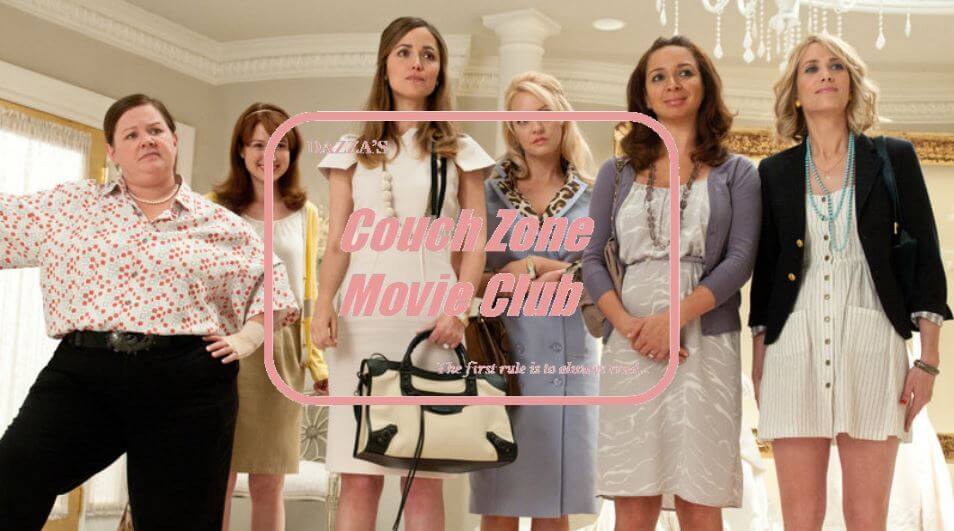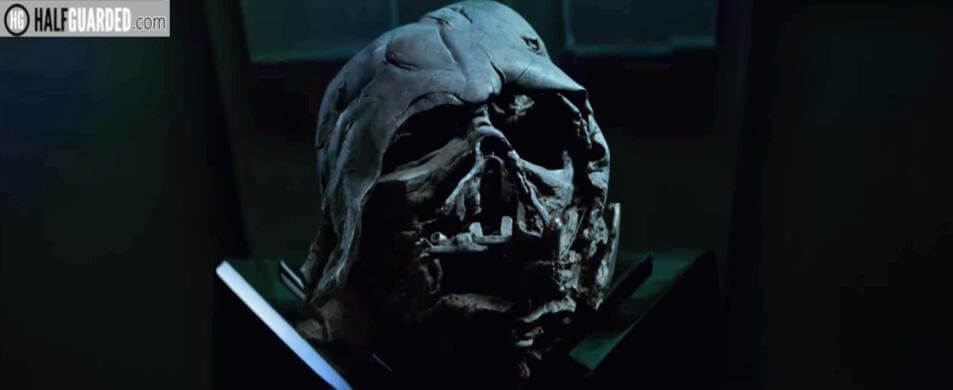In 2011 for the first time ever three films broke the one billion dollar line at the boxoffice. A golden age for the cinema going experience perhaps? Well a look at the top 10 money making movies for the year proves more sobering, as nine of them were sequels or instalments in long running franchises. The one that wasn’t, was the Smurfs movie.
Interestingly despite having two movies released that year (Captain America and Thor) Marvel were way down the list just sneaking into the top twenty (along with the Fox produced X-Men:First Class). So please let’s not be blaming the MCU for the state of cinema today, when the hands of the franchise craze had already begun to strangle multplexes by the time the Avengers were ready to assemble.
As always though there were so many cracking movies in 2011 just gagging for your support if only you were willing to plonk yourself in a screening and give em a go.
MoneyBall (director: Bennett Miller)

When trouble hit’s Brad Pitt’s baseball team he brings in that chubby one from the Seth Rogan films and tries to turn fortunes around with statistics and shit.
When you look at the premise of Moneyball it’s probably one of the most baffling sports movies of all time, as in it’s a sports movie with very little actual sport. Yes we have an underachieving baseball team (the Oakland Athletics), who are the underdogs come good and become challengers for the World Series, but there is very little baseball seen on the screen. What we get instead is lots and lots of dramatic MATHEMATICS and studying of STATISTICS. Gripping stuff! Personally I was ok with this as I once went to a baseball game in San Francisco and the most exciting thing I took from it was the hotdogs and beer were very nice. Seriously even Brad Pitt’s character Billy Beane doesn’t watch the games and he’s the bloody General Manager.
Yet Moneyball, based on the book by Michael Lewis (who also wrote The Big Short) on the way Oakland used statistics to build a team effective both on the field and the budget, is really fascinating. It helps that Brad Pitt is in charisma overdrive to bring some sparkle to a role that sees him mainly in meetings with scouts, managers and in player transfer negotiations. Each scene is written with a degree of conflict, humour and engaging dialogue to make the dry subject matter actually dramatic.
The dedication to being entertaining in Moneyball is vital, particularly when Beane meets Jonah Hill as Peter Brand (a composite of several real life people at the Athletics) and begins to throw a lot of theory at the audience. Brand revealing his groundbreaking philosophy of concentrating the attention on hiring players who have high levels of successfully getting to first base is explained sufficiently but with a backdrop of figures and players names, that makes the scene exciting as if a golden winning formula is being revealed.

Despite all the statistics talk, Moneyball is still about human drama and conflict. The new ideas that Beane and Brand bring causes division behind the scenes with Beane and his manager on the field (played by Philiip Seymour Hoff) and more viciously with his staff of scouts. There is obvious mistrust of Pete and his new ideas, especially considering that his method of statistics over assessing potential conflicts with the role they play in the game. It’s a clash of new ideas brought by an outsider (Pete is dismissed because his background is not in Baseball but economics) and the old guard and their refusal to accept new ideas. The fallibility of the scouting method is highlighted by flashbacks to Beane’s own career as a player, where despite been highly touted with potential was a failure in the professional game.
The sign of a well made sports movie is in it’s ability to be accessible to an audience that doesn’t follow that particular sport, while telling a story that succeeds in appealing to them regardless. Moneyball did that for me, making me enjoy a different angle of the sport’s team battling the odds with the point of view of the backroom staff, but still giving focus to the players many enjoying a second shot at their careers thanks to the budget grabbing focus of Beane and Brand.
There is some rich and subtly funny dialogue to be found in Moneyball, which is especially evident in the scenes with Pitt and Hill showing an immense amount of odd couple chemistry. Hill was a revelation having primarily been associated with Seth Rogan gross out comedies, yet brought a reserved subtly to his portrayal of the intelligent but socially awkward and out of his element around jocks statistician. The funniest scenes are with the pair, such as them practising Brand firing players and a complicated exchange with a number of fellow GM’s over the phone where Beane enacts a convoluted scheme to trade a player he wants (honestly I’ve seen Moneyball many times and I still find that hard to follow).
Moneyball is one of the films of the decade, scoring itself a ton of nominations including Oscar nods for best film, screenplay, and acting nods for Pitt and Hill. Naturally they didn’t win as the in movie that year was The Artist which they were throwing trophies at left right and centre. Remember the Artist? No didn’t think so.
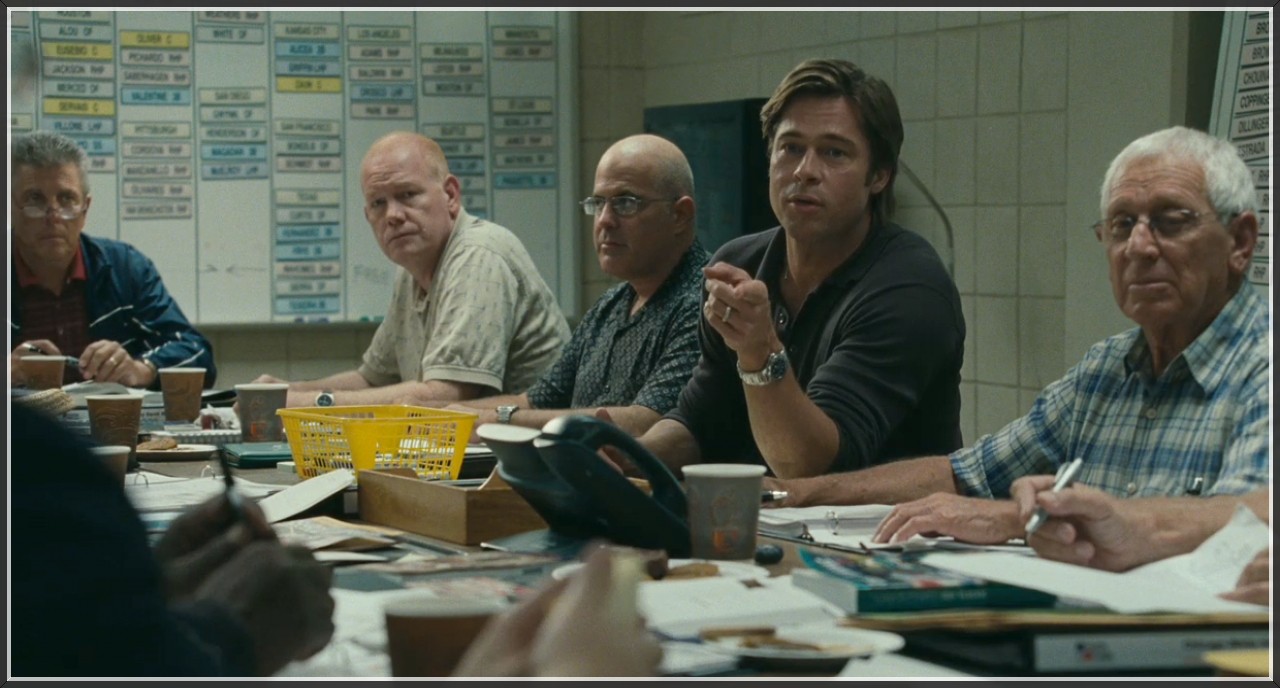
Attack the Block (director: Joe Cornish)

A bunch of little fuckers from an inner city neighbourhood are called upon to defend their home from alien invasion (don’t worry UKIP it’s the outer space type).
Imagine Finn from Star Wars trying to mug Dr Who, then the two of them teaming up to fight aliens. You’ve just imagined Attack the Block by Adam Cornish starring a young John Boyega and Jodie Whittaker before she pissed off a small section of Dr Who fans by taking the role of their beloved character while being in possession of a vagina.
We had no way of knowing we were seeing two future iconic sci fi figures in Attack the Block, but what we should have been raving about was a wild, excitingly refreshing take on alien invasion movies. It takes place in an urban estate, where a gang led by Moses (Boyega) are in the midst of mugging a young nurse on her way home when a meteorite crashes into a nearby car. As they start to loot the car they encounter an alien that they chase down and kill. When more meteorites descend upon the neighbourhood the gang go out with the intention of killing more aliens with plans to make a name for themselves and sell the bodies, however the new arrivals prove tougher and the gang are soon struggling to survive.
Attack the Block challenges the audience to be sympathetic towards a group of youths who in real life would no doubt scare the hell out of us is we encountered them. The film never shy’s away from the gang not being angels, they thief and threaten, and there is a cruelty in their desire to kill the aliens. Yet root for them you can’t help but do, especially as you get to know the gang and realise that for all the demonising of out of control youths, these are barely kids forced to live in a harsh underprivileged neighbourhood. Through the attacks the gang begin to show their bravery in saving others, and also their ingenuity in using what ever they can get their hands on to fight the aliens.
First time director Joe Cornish (who many in the UK will know from the wonderfully anarchistic Adam and Joe Show) brings an authenticity to the film having spoken to many youths from the neighbourhood depicted, and himself was inspired to wrote the film after he himself was mugged. Cornish was keen to know what sort of weapons the youths would have access to during such an alien attack. He also cast the youths from drama schools based in council estates.
/cdn.vox-cdn.com/uploads/chorus_image/image/62926320/attacktheblock_boyega_sword.0.jpg)
With it’s British setting, Attack the Block inevitably drew comparisons to Shaun of the Dead (Nick Frost has a role as the housing blocks drug dealer), however it refrains from being a comedy and plays the film straight. The film is as gritty as it’s urban setting, with some unpleasant deaths and a terrifying design for the invading hoard.
While the tendency in modern sci fi is to go with an abundance of tentacles and long limbs when designing an alien, the creatures in Attack the Block have a strikingly original look. The aliens resemble bears, (actually actors in Gorilla suits) with jet black spiky hair and fierce, luminous teeth. With a weird screech that seems a cross between a bird call and reptilian, the creatures are suitably creepy and menacing.
Attack the Block is a well written tale of redemption, with great performances from as of then unknowns and effects and action scenes that far exceeded it’s lowly budget. It featured a cast of diverse characters in terms of gender, race and class, years before there was a cry for such a film and it became the trendy thing to promote. Yet sadly audiences stayed away, only taking in 4 million against an 8 million budget and this was despite it been acclaimed by critics and featuring on best films of the decades list.
Attack the Block deserved more from audiences for such a passionately made movie. It’s a cult classic awaiting more people to discover it and has the curiosity of seeing Boyega and Whittaker in their early roles. It also established Cornish as an exciting director, who went on to co-write Antman and direct last year’s really good The Kid Who Would be King, which sadly again bombed at the box office. What the fuck is wrong with you people?
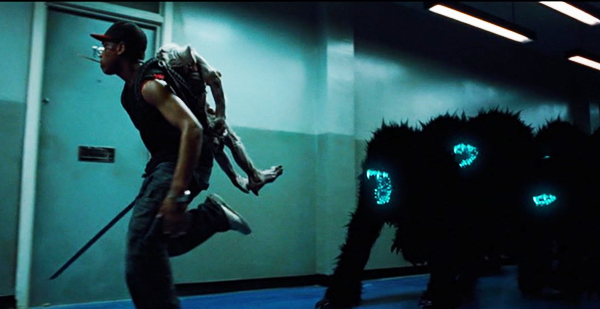
Bridesmaids (director: Paul Feig)

Annie Walker’s personal and professional lives are in tatters and while the chance to be her best friend’s maid of honour offers a welcome distraction the rivalry with a fellow bridesmaids threatens to drive a wedge with the one thing she has left. A nostalgic look at a time when you could have women in films without males freaking out.
2011 was a great year for comedies. Films like Horrible Bosses, Change-Up, Crazy Stupid Love, Friends with Benefits, 50/50 and the criminally overlooked Goon headed up an industry all of their own with relatively cheap to make but quality movies that often brought in a healthy audience.
In this rich year for comedy one film stood above all others, not only bringing in almost ten times it’s 32 million budget, but also being critically acclaimed and in a rarity for a straight comedy getting academy award nominated for best screen play.
When trailers arrived for Bridesmaids the vibe came across as “The Hangover with women.” Like that 2009 massive hit, Bridesmaids was built around the preparations for a wedding, with a massive dose of raunch, bad behaviour and dirty humour and the similarities furthered with tease of a bacherollete party in Vegas (which never actually happens in the film). However while the promotion focused on this side, audiences for Bridesmaids were treated to so much more, with a story with real pathos built on charcters.
Kristen Wiig is Annie, a woman down on her luck, broke after her cupcake business she put her life and soul into has failed and forced to apartment share to make ends meet. She’s newly single and is hooking up for sex with an arrogant jerk who wants little more from her than that. Her one constant is her friend bride to be Lillian for whom she’s agreed to be maid of honour, but that too seems under threat as a new friend the seemingly perfect Helen seems to be driving a wedge between them.
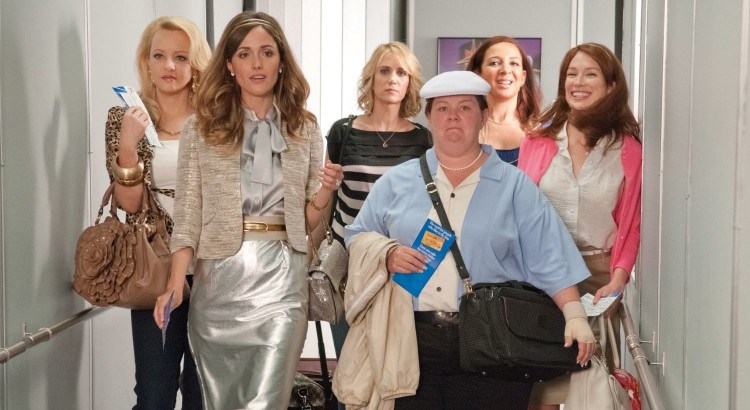
What’s great about Bridesmaids is that it’s a story strong enough to stand on it’s own even without the debauchery and hysterical laughs. Annie’s trials and stuck in a rut life really invoke sympathy. You see her broken hearted at the failure of her business that has taken away her desire to cook and her self worth taken such a battering that she baulks to get too involved when a new nice guy cop comes along played by Chris O’Dowd. While laughing at her calamitous attempts to maid of honour effectively, you also feel for her when she’s hurting for money yet has to deal with being surrounded by the glamour and wealth of her friends especially her rival Helen.
At times some of her problems are brought on by her own behaviour, her drunken freak out on the plane to Vegas (although it suspicious of Helen to pry her with a mix of booze and a sedative to “help her flying anxiety), and her outbursts at her job towards a young customer and her massive explosive rant at Lillian’s Wedding Shower (both of which are hilarious) but with everything she goes through and seemingly losing her best friend you still understand her breakdown. The last straw being Helen presenting Lillian with a Paris themed shower and a gift of a trip to that city, ideas which originally came from Annie.
This story could easily have been adapted to a serious drama, which the humour adds to the story as opposed to being built on it. Said humour is brilliant, ranging from witty sarcasm to all out gross humour on occasion (honestly I hate the infamous bathroom food poisoning scene), played perfectly by a cast which got their careers as comedy mainstays from Bridesmaids. Wiig and Maya Rudolph (as Lillian) got their big break to transition from SNL to big feature films here, while establishing Rose Byrne as Comedy actress. Yet the biggest career making role was in shooting Melissa McCarthy into a bonafide Hollywood Star.
At first Mccarthy’s role as fellow Bridesmaid Megan Price appears to be the over the top, brash, foul mouthed, outrageously eccentric, with shades of the Alan character in Hangover. However her being the “annoying” one is tempered by her hilarious character (like most of the audience I cracked up when she drives away from the wedding shower with nine of the party favour gift puppies crammed in her car) but also the kindness she ends up showing to Annie. Megan is the one with the warmth to reach out to Annie, realising why she is hurting. Like Annie she doesn’t fit in with the other women, yet unlike Annie she is comfortable in her oddball identity.
Mccarthy’s film stealing performance earned her an academy award nomination for the role and a ton of other awards. Her standing out is especially impressive because the film is full of such memorable characters. Despite not having as much screen time as the other bridesmaids, Elle Kemper as sweet, innocent Becca and Wendi Mclendon-Covey as glamorous but marriage-weary Rita shine in support. Meanwhile there are littered hilarious small roles for Matt Lucas and Rebel Wilson as Annie’s weird flatmates and Franklyn Ajaye who has literally two lines of dialogue as Lillian’s father but is memorable for both.
Bridesmaids is smart, darkly funny, moving and with strong varied characters and everything a great comedy needs to stay relevant for years to come. It struck a cord with audiences, which in turn raises the question just why did going to see comedies go out of favour. 2019 saw great comedies such as Booksmart, Late Night, Long Shot and Good Boys, with only Good Boys bringing in over 100 million. Booksmart and Late Night each only did around 25 million (Fortunately the budgets were very low). Frankly I think now more than ever we need something to laugh about.

WTF?
I’ve really not got the energy for my WTF? moment for 2011, because this one is just so damn depressing. Really, I’m not violently against remakes (though to be honest there are very few that would make me glad they exist), however when they take a comedy that I love and butcher it with an obnoxious lead it makes me want to make Hollywood burn.
Arthur from 1981 was funny, with a strong character driven story and featured a charming performance from Dudley Moore who had incredible chemistry with his co stars Liza Minelli and John Gielgud .
Arthur from 2011 is not funny and has an obnoxious, self obsessed, full of himself twat in the lead role. Russell Brand while having the experience of been self indulgent, a heavy drinker and flaunting his wealth and excessive lifestyle would make him perfect for the role of a 21st century version of Arthur, has none of Moore’s dry delivery and boyish charm. Simply put Brand makes Arthur as annoyingly odious a brat as Brand is in real life.
Avoid this like the plague and watch the 80’s version instead.
That’s all from me. If you want to give me feedback and agree with me you can find me on twitter as @Dazzalovesmovie (i ran out of letters).
see ya
Dazza

